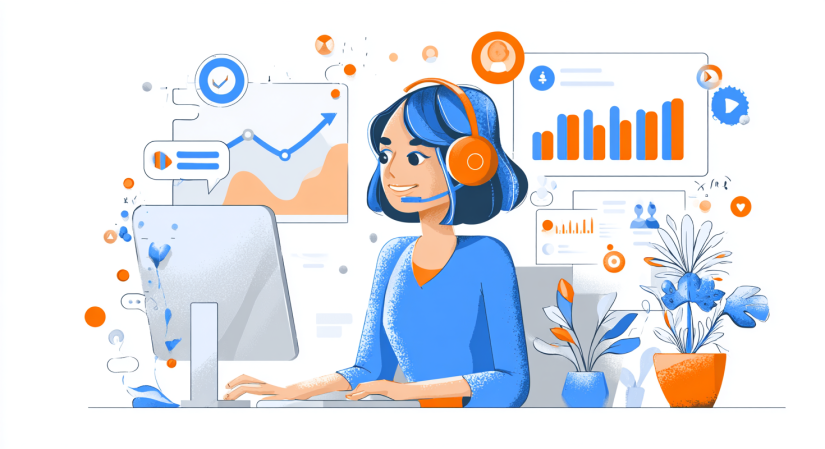TL;DR
- AI agents are transforming the customer experience, automating routine tasks seamlessly.
- The best CX strategy blends AI agents with human expertise for enhanced interactions.
- Businesses leveraging AI agents see improved efficiency and customer satisfaction.
- AI agents enhance, not replace, human support—creating a balanced CX model.
- Future-ready companies invest in AI agents to drive innovation and customer loyalty.
The battle between humans and artificial intelligence in customer experience (CX) is a myth.
The reality?
The future belongs to businesses that understand the science of seamless AI-human collaboration.
Organizations that understand the collaborative power between AI and human intelligence will lead the way, creating exceptional customer experiences and staying ahead of the competition.
So, how do you ensure your company thrives in this AI-driven CX revolution?
As customer expectations shift, businesses must evolve. Here’s how CX has transformed—and why AI and human intelligence must work together.
By 2030, 85% of customer interactions will involve AI, but humans will remain critical to customer satisfaction.
A New CX Landscape: The 70-25 Insight
The CX landscape is evolving, blending AI efficiency with human expertise. Finding the right balance is the key to exceptional customer experiences.

This shift didn’t happen overnight—CX has evolved through distinct phases, from traditional customer service to today’s AI-driven experiences.
The Evolution of CX: From Human-Led to AI-Augmented
The customer experience has advanced significantly, from face-to-face interactions to AI-powered productivity. Knowing this evolution helps businesses stay ahead.

Organizations that adopt the coexistence model of humans and AI are at the forefront of this evolution. Convin automates routine queries via automated calls while empowering agents with real-time insights, ensuring seamless and efficient interactions.
Why Both Human and AI Agents Are Essential

AI agents bring scalability, efficiency, and data-driven insights, while human agents excel in empathy, relationship building, and nuanced problem-solving. This equilibrium model is crucial for effectively addressing routine and complex customer queries.
However, this ensured human agents remained at the forefront of customer trust and loyalty.
Bottom line?
AI can’t replace human judgment, and humans can’t match AI’s speed. The magic happens when they work together.
Klarna’s AI-Human Integration
Klarna reduced resolution times by over 80%, automating 66% of queries with AI while enabling agents to focus on complex tasks. [Source]
This blog is just the start.
Unlock the power of Convin’s AI with a live demo.

The CX Challenges Companies Face
Despite the benefits of AI, many organizations struggle with CX transformation.
- Resistance to Change: Employees and customers are wary of AI-driven interactions.
- Over-Reliance on AI: A purely AI-driven strategy risks losing the human touch.
- Lack of Training for Hybrid Models: Businesses underinvest in training agents to work effectively alongside AI.
Companies risk alienating customers rather than enhancing their experiences without addressing these challenges.
Strategies to Build an AI-Human CX Model
- Invest in AI-Human Collaboration: Use AI for automation but keep humans in control. Deploy AI to handle repetitive tasks and assist human agents rather than replace them.
- Upskill Agents for AI-Enhanced Roles: Train agents to use AI-powered insights and focus on problem solving and relationship-building.
- Adopt a Hybrid CX Strategy: Ensure customers experience a seamless transition between AI and human agents, eliminating frustration.
- Build Customer Trust in AI: Be transparent about AI’s capabilities. Customers need to know when they’re talking to AI vs. a human.
- Continuously Monitor and Optimize: Leverage CX analytics to measure AI-human collaboration effectiveness and refine strategies.
Analytics with AI transforms data into functional CX enhancements. Find out how!
Voicebots and Live Chat Agents: The Perfect Pair
Outsourcing live chat agents can immediately boost CX for businesses seeking flexibility and expertise. These agents, often equipped with AI support, handle a wide range of tasks, from resolving queries to generating leads, ensuring a human touch where needed.
Voicebots handle high volumes of repetitive inquiries, allowing live chat agents to focus on empathetic interactions. Outsourcing live chat agents further ensures scalable and cost-effective CX operations while maintaining a personalized touch.
Together, they represent a robust business strategy to enhance customer loyalty and operational efficiency.

Convin's Role in Driving the AI-Powered CX Transition

Convin stands at the forefront of revolutionizing CX, ensuring businesses maximize the synergy between AI and human intelligence.
- Automates routine queries via AI Phone Calls
- Empowers agents with real-time assistance.
- Improve business outcomes with conversation analytics.
These tools result in tangible improvements:
- 27% increase in CSAT.
- 12% more repeat purchases.
- 56-second reduction in average handle time.
To remain competitive, organizations must embrace the different types of agents in AI while continuing to refine the human aspects of customer service.
Investing in tools like Convin ensures businesses are ready to meet evolving customer expectations with agility and confidence.
As Ashish Santhalia, CEO of Convin, states,
The future of CX isn’t about humans versus AI; it’s about humans and AI working together to deliver extraordinary experiences.
Conclusion: Embracing the Co-Existence of Humans and AI
Businesses that adopt a hybrid approach will deliver exceptional, scalable, and empathetic customer experiences.
Understanding the different kinds of AI agents and how they work in tandem with human agents is essential to staying ahead of the competition as AI becomes a more significant component of CX.
Discover how to scale your CX strategy with AI agents and hybrid human collaboration.
Frequently Asked Questions
1. What are the different types of agents in AI?
AI agents are classified into simple reflex agents, model-based agents, goal-based agents, utility-based agents, and learning agents. Each type serves distinct purposes, from handling basic tasks to improving through continuous learning.
2. How do intelligent agents in AI improve CX?
Intelligent agents enhance CX by automating routine tasks, providing real-time insights, and ensuring efficient customer interactions, enabling live agents to focus on complex queries and relationship building.
3. What role do voicebots play in customer support?
Voicebots handle repetitive inquiries efficiently, reducing wait times while escalating complex issues to live chat agents for personalized support.
4. Should businesses outsource live chat agents or rely solely on AI agents?
Outsourcing live chat agents can complement AI agents, combining scalability and cost-efficiency with the empathy and creativity of human support for a balanced CX strategy.
5. How do live chat support agents benefit from AI tools?
AI tools like real-time guidance and conversation analytics help live agents enhance performance, resolve issues faster, and improve customer satisfaction.





.webp)



.avif)